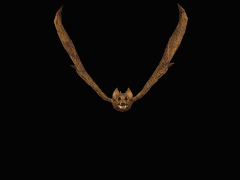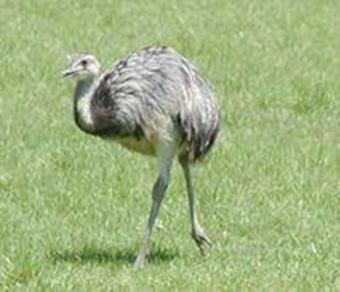


|
Rheiformes:
The Rhea, also known as ñandú (pronounced [ɲanˈdu]) in Spanish, or ema in Portuguese, is a large flightless ratite bird native to South America. The name was given in 1752 by Paul Mohring; his reason for choosing this name, from the Rhea of classical mythology, is not known. Rheas are polygamous, with males courting between two and twelve females. After mating, the male builds a nest, in which each female lays her eggs. The male incubates from ten to sixty eggs; the chicks hatch within 36 hours of each other. The females, meanwhile, may move on and mate with other males. While caring for the young, the males will charge at anyone — including humans and female rheas — who approaches the chicks. Rheas are omnivorous, preferring broad-leafed plants, but also eating seeds, roots, fruit, insects, and small vertebrates. |
